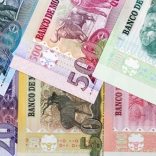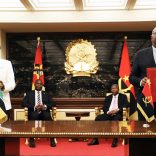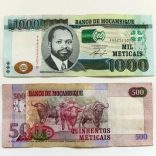Mozambique posts €300 million budget deficit in Q2, down €133.7 million YoY – government
Mozambique’s debt woes an eye-opener, Standard Chartered says

Reuters (File photo) / A man walks past the head office of Standard Chartered bank in the City of London
Mozambique’s hidden debt and default threat have opened investors’ eyes to what can go wrong if they don’t ask enough questions, according to Standard Chartered head of Africa research, Razia Khan.
“The additional degree of scrutiny, the greater transparency, it’s not necessarily a bad wake-up call that you do need to do the due diligence and you do need to scrutinize greatly all of the numbers you see,” Khan said Wednesday in an interview at the African Development Bank’s annual meetings in the Zambian capital, Lusaka. “There isn’t necessarily an expectation that the same situation will be replicated elsewhere in Africa.”
Mozambique’s government in April owned up to the existence of $1.4 billion of undisclosed borrowing by the Interior Ministry and state-owned security companies Proindicus and Mozambique Asset Management. While Proindicus made a $24 million interest payment on its $622 million facility on March 21, Finance Minister Adriano Afonso Maleiane said last week MAM won’t be able to honour its $178-million interest payment that was due on May 23. The government is unwilling to convert the loan extended to MAM into sovereign debt to avoid a default, an official familiar with the situation, who asked not to be identified because he’s not authorized to speak on the matter, said on Tuesday.
Investors “weren’t intrusive enough” and didn’t ask enough questions about Mozambique’s bonds, Investec Asset Management CEO Hendrik du Toit said earlier this month in the Rwandan capital, Kigali.
Credit Rating
Fitch Ratings cut Mozambique’s credit rating by one level to CC this week, saying disclosure of the new debt revealed significant short-term repayment obligations. The International Monetary Fund canceled a mission to the east African nation in April after the debt disclosure and its First Deputy Manager Director David Lipton said in an interview this month the fund is working with the government to solve the problems.
Zambia’s recent talks with the IMF are a positive development for the copper producer and a best case scenario for the economy would be a deal with the Washington-based lender, alongside higher metal prices, Khan said.
The southern African nation had earlier said it was working to seal an “inevitable” aid program from the fund by the end of the year, as its economy strains under falling metal prices and a severe power shortage. Any IMF deal will probably require the government to cut subsidies on fuel and power, which lender in March estimated could cost the treasury $660 million this year.
“Sentiment towards Zambia is enormously driven by copper,” Khan said. “If we should see a reasonable enough rally in copper emerging, then I think that for many people, especially if they can be satisfied that there is willingness to reform in Zambia, it will make investors that much more positive on the outlook.”












Leave a Reply
Be the First to Comment!
You must be logged in to post a comment.
You must be logged in to post a comment.